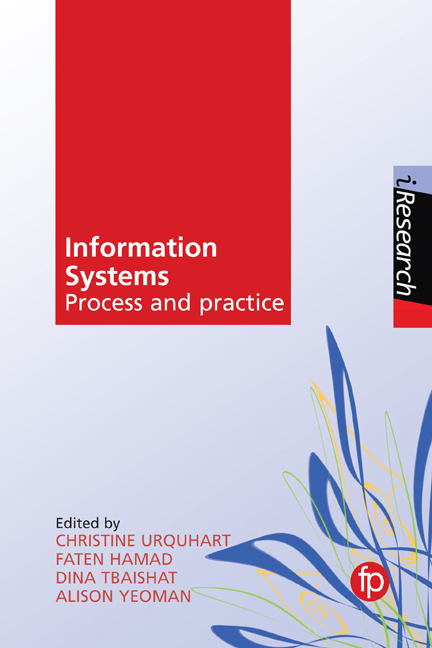Book contents
- Frontmatter
- Contents
- List of tables and figures
- Series editor's foreword
- About the authors
- 1 Introduction
- 2 Approaches to information architecture
- 3 Taxonomy testing for information architecture
- 4 The enterprise website and its information structures
- 5 Analysing activities, roles and processes
- 6 Libraries and the organisation of library processes – a history of operational research, and the use of process modelling
- 7 Using Riva process modelling to study book acquisition in academic libraries
- 8 Workflow analysis and process mapping in US academic libraries
- 9 A theoretical framework for designing and evaluating semi-structured document triage interfaces
- 10 Resource discovery case studies
- 11 Increasing social connection through a community-of-practice-inspired design
- 12 Methods for studying information provision, networking and communication in patient support groups
- 13 Health information systems: clinical data capture and document architecture
- 14 Producing systematic reviews and getting evidence to the clinician
- Index
1 - Introduction
Published online by Cambridge University Press: 08 June 2018
- Frontmatter
- Contents
- List of tables and figures
- Series editor's foreword
- About the authors
- 1 Introduction
- 2 Approaches to information architecture
- 3 Taxonomy testing for information architecture
- 4 The enterprise website and its information structures
- 5 Analysing activities, roles and processes
- 6 Libraries and the organisation of library processes – a history of operational research, and the use of process modelling
- 7 Using Riva process modelling to study book acquisition in academic libraries
- 8 Workflow analysis and process mapping in US academic libraries
- 9 A theoretical framework for designing and evaluating semi-structured document triage interfaces
- 10 Resource discovery case studies
- 11 Increasing social connection through a community-of-practice-inspired design
- 12 Methods for studying information provision, networking and communication in patient support groups
- 13 Health information systems: clinical data capture and document architecture
- 14 Producing systematic reviews and getting evidence to the clinician
- Index
Summary
Introduction
This book attempts to bridge some of the gaps between discrete areas of research that information professionals could use to design helpful and effective information systems and services. We know the problem of silo thinking, and it can be hard to make the connections, to see patterns and the big picture across different research cultures, or even within one broad discipline. An editorial in MIS Quarterly(Goes, 2013) points out that information systems research has many streams, many different ways of thinking and doing research. This variety is healthy and probably unavoidable if the broad discipline is to grow and flourish. We are not alone in library and information science and information systems research in facing challenges in deciding how to do research or evaluate practice. It helps to have different perspectives on a problem. Different viewpoints can help to formulate a research question that can be answered, help decide on appropriate methods to use and help to discuss the findings in relation to the existing evidence.
As a group of editors, we have diverse areas of research and teaching interests, covering information retrieval, health information research, knowledge translation and evidence-based practice, information behaviour research, systems analysis and business process analysis. Our teaching and research experience has helped us realise that there are problems with communication across different silos. For example, information architecture within the library and information science field has often been the study of content management. Information seeking may be accommodated for navigation tools, but the activities, processes and workflows that might accompany an information systems architecture may be less obvious. Information behaviour research often seems separate from research on the design of information systems. The context that is so important in information behaviour research may come into personal support and services to support the information systems (hence much of the work on information literacy) but information behaviour research may not contribute directly to information systems design as much as it could. Information behaviour research often focuses on information seeking, and less attention is given to the use of information, and the processes involved in this.
- Type
- Chapter
- Information
- Information SystemsProcess and Practice, pp. 1 - 8Publisher: FacetPrint publication year: 2017



